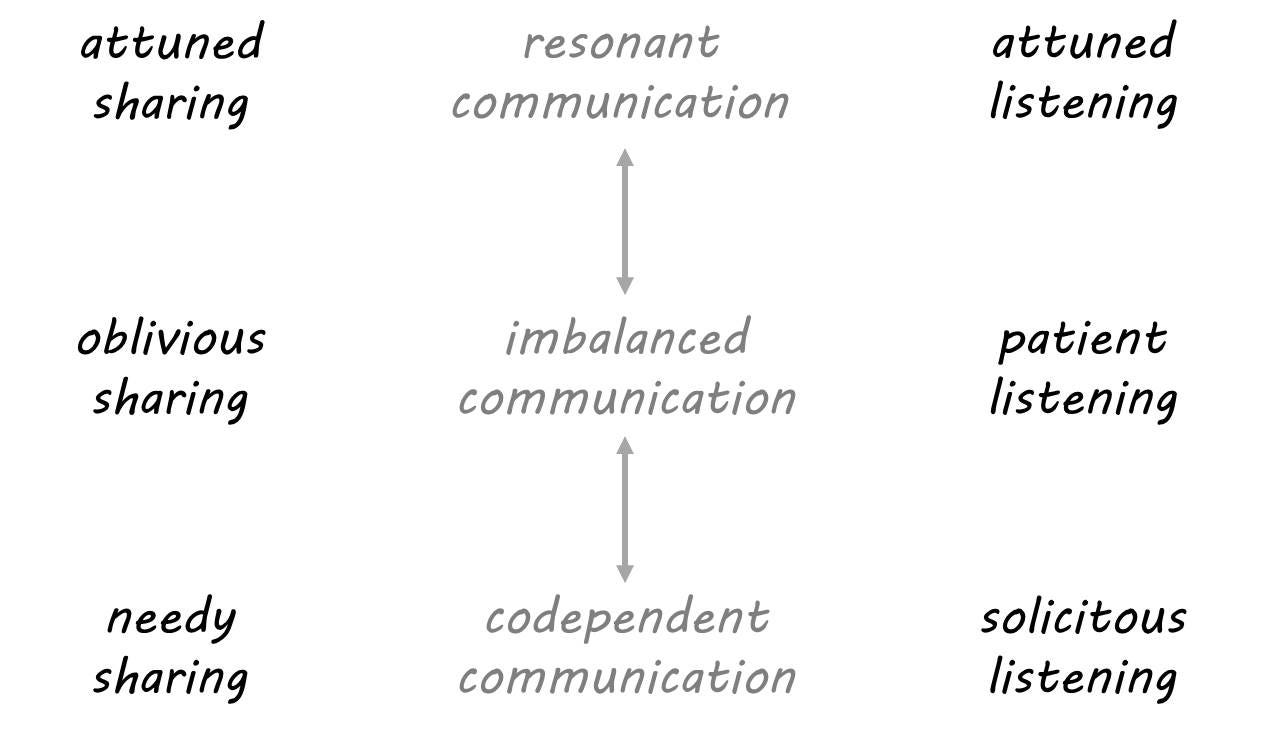
Last fall I shared a framework of balanced and imbalanced masculine and feminine aspects, seeking to move out of separation and codependency toward cocreation and resonance.
These are not aspects of men and women, per se, but co-creative pairs, the warp and weft of the patterns and stories we weave together. Mind and body, structure and flow, knowledge and mystery, speaking and listening.
Over the past months, I have come to view communication and relationship through a similar framework - one that I would share in case others might find it helpful.
How we communicate is reflective of our underlying relationships, and as we become aware of these communication patterns we can work to shift them, to also shift the way that we relate to one another.
Codependent communication
Codependent communication is all about needs and validation - one person who feels validated by having their needs met and another person who feels validated by meeting another’s needs. Both people can play both roles in different ways - perhaps one person has more emotional needs and the other has more of a need for commitment.
Needy sharers are hoping for a certain response: validation, emotional support, financial support, physical actions, loyalty. When they are sharing, they are solely focused on themselves. If their conversation partner is not engaging with their stated or implied needs, they feel like they’re not being heard or understood.
Solicitous listeners are intensely focused on emotions or needs being shared, and they have a need within themselves to be of service, to fix problems, to offer support, to make it better for the other so that they themselves can feel better or validated. When they are listening to a needy sharer, they are solely focused on the other and not on their own experience.
Imbalanced communication
Imbalanced communication is not so much a matter of expressing and fulfilling needs, but it often involves one person doing most of the talking and the other doing most of the listening, and it doesn’t usually lead to a deeper connection or a deeper mutual understanding.
Oblivious sharers like to have someone to talk to. If someone is interestedly listening to them, they feel like they’re having a good and connecting conversation. The level of obliviousness ranges considerably from simply being absorbed in telling a story to “mansplaining” or being completely out of touch with where the other is at. When asked a question, they will often launch into a story that turns into another story that meanders and leaves a patient listener wondering when it will next be their turn, and what the topic of conversation might be at that point. Their focus is primarily on themselves and on their own thought process.
Patient listeners are hesitant to take up conversational space unless invited and will not cut off someone who is speaking. Their focus is primarily on the other, usually in the form of asking questions about the story being told or offering short snippets of their own experience, which - if the other is an oblivious sharer - usually leads to another long meandering monologue. Patient listeners tend to be somewhat shy, so they are usually glad that someone is talking to them even if they are not being invited to be fully present as themselves.
Resonant communication
Resonant communication is like dancing in sync with someone, constantly improvising, alternating who leads and who follows and building trust, connection, understanding. Resonant communication is seeing and being seen, giving and receiving love, in an expansive sense.
Attuned sharers are equally present with themselves and their conversation partner. They notice when the listener is ready to speak and leave space often. They sense whether the listener is interested in a particular topic or level of detail and shift accordingly. They invite patient listeners to speak up, to take up equal space. They assure solicitous listeners that they don’t need or expect anything beyond being heard, understood, seen.
Attuned listeners are also equally present with themselves and their conversation partner. They mirror what is expressed back, to show that they understand. They are curious and ask questions that help the sharer to feel more deeply into their own experience. They allow the sharer’s words to resonate within them, illuminating their own parallel experiences or perspectives, allowing them to readily switch places and become attuned sharers.
We all fill all of these relational roles at times. I have been a needy sharer - how did I do? did you like it? do you still care about me? I have been a solicitous listener - oh you have a problem, I can fix it! oh you doubt yourself, let me build you up! I have been an oblivious sharer - I know all about this topic, let me explain! And I have, perhaps most often, been a patient listener, taking in what others express while remaining quiet, not having much to say.
As I have been growing more conscious, more whole, more embodied within myself, I have also found myself becoming more attuned in conversation. Attuned but also somewhat detached, aware of the dynamics at play. I find myself less tolerant of solicitousness - an attempt to fix or soothe or empathize rather than simply to listen and understand. And I find myself less comfortable being a patient listener, sensing when the sharer drifts out of relational attunement. And this has led to conversation about conversation, about the way that we relate, which can then shift into deeper attunement and resonance. Or sometimes there is not a resonant shift - relationship takes two - and then there is a growing feeling of distance between us.
Does this framework resonate with your own experience?
What roles do you play most often?
What has helped you to shift into relational attunement?





There is nothing quite like the sweet spot of resonant communication!
Holy moly, I wasn't expecting this topic and loved every inch of it. I can certainly apply to Substack conversations, too, can't it??? Lots of food for thought here. Parsing these differences is quite something and it's a framework I've never had before. Thank you!